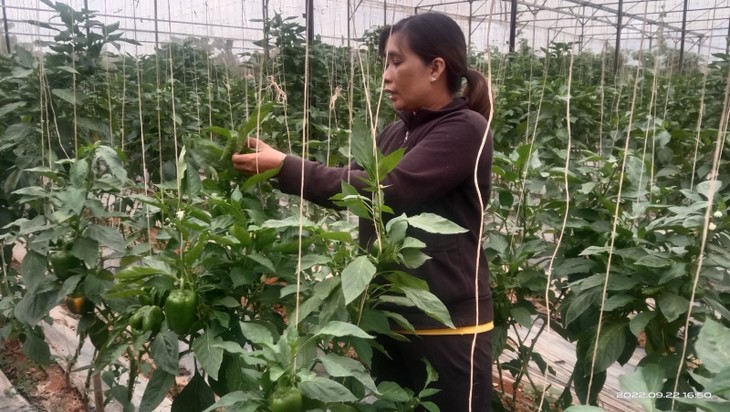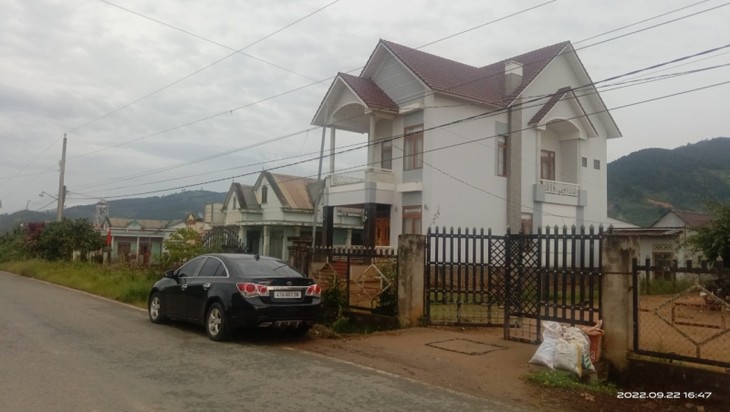(VOVWORLD) - In recent years, ethnic minorities in the Central Highlands province of Lam Dong have invested a lot in high-tech to produce more profitable vegetables and flowers. Farmers in Phi To commune, Lam Ha district used to make money by growing coffee, but now they earn all year round after adopting the lagim model - growing vegetables, tubers, and fruits in a greenhouse.
 Ka Luong takes care of the trees under the lagim model in her greenhouse. (Photo: VOV) Ka Luong takes care of the trees under the lagim model in her greenhouse. (Photo: VOV) |
Visitors to Phi Sour hamlet are impressed by the spacious houses that alternate with coffee gardens and green houses.
The house of Ka Luong, who belongs to the K'ho Sre ethnic minority, stands beside a paved road. Behind the spacious house is a 700-square-meter greenhouse equipped with automatic watering and fertilizing systems. This is the first lagim model greenhouse in the hamlet.
Ka Luong told VOV that her family spent 21,000 USD to build the greenhouse and borrowed 1,300 USD at a preferential interest rate from Lam Ha District’s Bank for Social Policies for start-up costs.
After her first successful crop, Ka Luong borrowed another 850 USD to grow chayote trees and other kinds of vegetables.
Luong said locals who have been growing coffee need to learn new methods when they switch to other crops.
She told VOV, “I taught myself how to take care of the trees. I had to go to Don Duong district to see how the Kinh women there tend trees under the lagim model, and which varieties they use.”
Greenhouse cultivation is very different from coffee farming. Luong says she takes care of the trees whenever she finds time during the day.
The method requires meticulousness, especially the techniques to prevent diseases. All the products produced by Luong’s family are purchased by traders for more than the market price.
Ka Luong earns about 420 USD a month growing fruits and vegetables in her 700-square-meter greenhouse. This income covers her family’s daily expenses. Her family also grows coffee and raises cattle and poultry.
Luong admitted that changing to the greenhouse lagim model was a breakthrough for her family.
“In the past, ethnic minorities used primitive farming methods. So did the K'ho people,” said Luong, adding , “We had to borrow money for our children's school fees. The money from coffee wasn’t enough to pay our debts, even though we have a couple of hectares of coffee. Then I was advised to change to the lagim model. Although the earning from one crop is not much, there are several crops per month.”
 Spacious houses are commonly seen in Lam Ha district, Lam Dong province. (Photo: VOV) Spacious houses are commonly seen in Lam Ha district, Lam Dong province. (Photo: VOV) |
The Women's Unions in Lam Ha district have mobilized their members to apply high-tech to crop and livestock production. They have located lenders and helped members borrow money for development.
Lam Ha district’s Women's Union has collaborated with banks to help women obtain capital and use it effectively. More than 5,000 members have received loans worth about 5.9 million USD.
Chi Ka Soanh, Chairwoman of the Women's Union of Phi To commune, said that in recent years, there have been many changes in local production, especially for ethnic minority women.
“Ka Luong is a K'ho ethnic member of the Women's Union. She has venturesome spirit and takes pains to study ways to develop her household economy. She’s really an outstanding member. I wish all women, especially our ethnic members, would follow Ka Luong's example. It’s a way to contribute to local socio-economic growth,” said Chi Ka Soanh.
The living conditions of ethnic minorities in Lam Ha district have changed thanks to their own efforts and the support of government agencies.
In August, the Lam Ha district People's Committee approved 800 ethnic minority households for preferential credit. Phi To commune alone has nearly 100 households, each of which can borrow 4,200 USD.